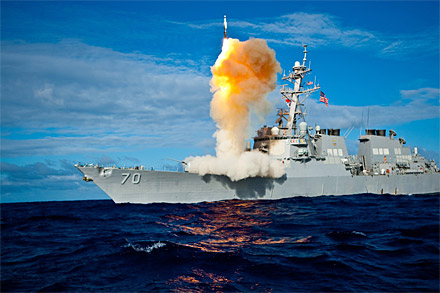
Russia’s “Hysterical Pregnancy” About Missile Defenses
Publication: Eurasia Daily Monitor Volume: 8 Issue: 115
By:

Russian officials from President Dmitry Medvedev and down have recently subjected the US and NATO to a typical diplomatic offensive against missile defenses in Europe. In this offensive Russian spokesmen have reiterated their undying belief that missile defenses threaten Russian nuclear weapons, strategic stability, the survival of the new arms control treaty, and cooperation with NATO over Libya (www.kremlin.ru, May 18; www.km.ru, May 13). Typically, starting with Medvedev, they have inveighed against these systems that if they proceed not only would Russia have to consider abrogating START III, but it would also need to start building nuclear weapons that allegedly can penetrate these defenses and thus return to an arms race (Interfax, June 9; www.kremlin.ru, May 18). If the US and NATO were to build these systems, Russian officials and military figures argue that parity and strategic stability would be at risk.
It should not escape alert observers that these threats are exactly the same ones that Vladimir Putin et al made in 2007-2008 against missile defenses. Despite the fact that innumerable briefings have outlined the limited scope of the Obama Administration’s program which is still more limited than was the Bush Administration’s program – whose progenitors also emphasized the lack of a threat against Russia –Russian officials continue to trot out the same threats as before. Thus, we also still see claims that North Korea and Iran are not developing nuclear weapons or are no threat to anyone even though Moscow moved S-400 SAMs to its Far East and suspended the sale of the S-300 SAM to Iran and joined in imposing sanctions upon it. In other words, from Moscow’s perspective nothing has changed. The implications of this offensive are therefore disturbing. First of all, it assumes that Western chancelleries are credulous fools who cannot see the motives behind Moscow’s earlier deployments of SAMs or the termination of its program to Iran, Russia’s own continuing missile defense program, or the fact that its defense procurement priorities are for more and newer nuclear missiles that can penetrate defenses. Indeed, these plans must go back years, probably before 2006, when this issue began to gain traction. Thus, Russia’s new missiles that allegedly can penetrate these defenses presuppose a nuclear conflict in advance of any plans the US had to build the current adaptive phased program of missile defense (Russia Today, May 25; https://russiandefpolicy.wordpress.com/tag/vladimir-popovkin/, February 25).
Even so, Moscow, by its own admission, cannot reach the new treaty’s limits for nuclear weapons, suggesting the basis for its fears. Moscow also assumes that NATO is not a threat because otherwise it would not have suspended the Conventional Forces in Europe (CFE) treaty in 2007, a move that makes sense only if there is no presumed conventional threat. Furthermore, it is quite clear that what is objected to is any missile defense system that Moscow cannot control or veto.
Russia’s demands upon NATO have been for a share in command and control over any potential system even as it has been the only power to threaten European states form the Baltic to the Black Sea with missile strikes in the last decade. The opposition to any kind of missile defense by NATO against Iran also illustrates that for Russian planners the bedrock condition of Russian security is Russia’s capability to intimidate or strike Europe with these weapons. In other words, the condition of Russia’s security is Europe’s ongoing insecurity and its leaders still cannot advance beyond this situation of being able to incinerate Europe that McGeorge Bundy described once as the existential condition of the Cold War. This campaign also confirms that Russia still views the relationship with the US as being one that presupposes hostility, and the need for mutual deterrence whereby the US shackles itself to Russia and foregoes qualitative or other improvements of its forces while Russia retains a more or less free hand to proceed as it wishes to do. This stance fully contradicts the trend in US policy over the last decade, if not more, to view Russia as less and less of a threat.
Under the circumstances it is quite understandable that the talks with Russia have gone nowhere and that Moscow is increasingly complaining that NATO does not take its interests seriously (Kommersant, RIA Novosti, June 9). Considering how little regard Russian planners have for European security interests, this is not a justified complaint. But it does underscore the asymmetry on both sides and the fact that for many Russian planners and elites, e.g., Sergei Karaganov of SVOP, that the Cold War continues. This campaign also highlights that for Russia, as Michael Bohm observed, missile defense issues have led it into mimicking the psychological symptoms of a false or hysterical pregnancy, i.e., what he calls a hallucination (The Moscow Times, June 7). For this syndrome the answer is not more threats but rather more negotiation, and one hopes Moscow learns that lesson.




